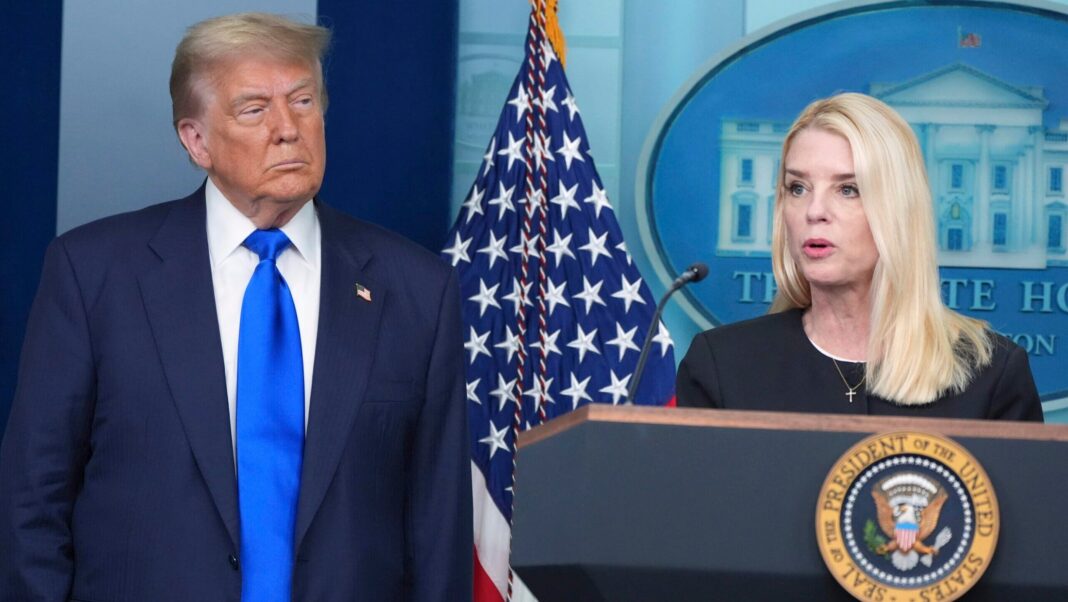Trump’s Approach to Political Rivals: A Deep Dive
Eight months into his second term, President Donald Trump’s long-held pledge to confront those he perceives as political adversaries has ignited a fiery debate around free speech, media censorship, and the specter of political prosecutions. This topic is more than just a political maneuver; it’s shaping the narrative of his administration and the broader landscape of American democracy.
Escalation of Retaliatory Tactics
With a noticeable uptick in aggressive rhetoric, Trump has made clear his intentions to pursue legal actions against certain political opponents. This strategy, rooted in a broader vow of retribution, underscores a commitment to consolidating power within his administration. His public pressure on Attorney General Pam Bondi to investigate adversaries illustrates a troubling trend where the judiciary risks becoming a tool for political vendetta.
In a social media post, Trump expressed frustration that “nothing is being done” regarding investigations into his foes, proclaiming, “JUSTICE MUST BE SERVED, NOW!!!” Such declarations lead to anxious discussions among lawmakers about the implications of a president directing legal action against political rivals.
GOP Responses: A Split Between Loyalty and Ethics
Responses to Trump’s tactics have varied significantly within the GOP. Senator Rand Paul of Kentucky cautioned that it is deeply misguided for the Trump administration to mirror tactics utilized against him. This sentiment reflects a broader concern among some Republicans about the potential for misusing the power of the presidency.
Conversely, figures like Senate Democratic leader Chuck Schumer have loudly condemned Trump’s approach, claiming it turns the Justice Department into an apparatus that targets political enemies. He warns that such an approach threatens to dismantle the cornerstone of American democracy and could eventually backfire on conservatives should the political tables turn.
Political Prosecutions and New Appointments
Recent developments in Trump’s administration showcase a pattern of appointing loyalists to positions critical in enforcing political control. The nomination of Lindsey Halligan as U.S. attorney in the Eastern District of Virginia exemplifies this strategy, particularly as this office is involved in investigating Letitia James, a vocal critic of Trump.
This reshaping of justice could lead to a troubling precedent: the installation of individuals whose primary allegiance lies with the president rather than the rule of law. Critics argue this shifts the focus from impartial justice to a politicized narrative that favors friends while punishing adversaries.
Restrictions on Free Speech: The Pentagon and the Media
In an ironic twist, Trump has positioned himself as a staunch defender of free speech, even as new restrictions emerge. A recent Pentagon memo has upped the ante on restrictions imposed on reporters, requiring them to sign a pledge not to report unapproved information. This move contradicts Trump’s earlier proclamations about championing free speech and raises concerns about the state of journalistic freedom.
Furthermore, Trump’s history of suing media organizations for negative coverage has created a chilling effect among journalists. This has led to speculation about whether Trump’s administration is intent on controlling narratives through intimidation and legal threats.
The Case of Jimmy Kimmel: A Reflection on Censorship
Perhaps the most striking illustration of this dynamic is the ongoing saga of comedian Jimmy Kimmel. His indefinite suspension from ABC after a controversial comment sparked widespread debate about freedom of expression. While some lauded ABC for taking decisive action, others saw it as a capitulation to political pressure.
Regulatory bodies, like the Federal Communications Commission (FCC), have also weighed in, hinting at potential repercussions for media companies that fail to adhere to political sensitivities. The remarks from FCC Chairman Brendan Carr, suggesting that Kimmel’s comments could warrant accountability, reflect an uncomfortable intersection of media, government, and corporate interests.
Diverse Opinions Among Conservatives
Within conservative circles, opinions about Kimmel’s suspension and broader media censorship remain divided. Some, like GOP Senator Ted Cruz, argue against governmental overreach in determining acceptable speech, asserting that political pressures should not dictate corporate decisions. Others, however, support actions taken against media personalities who cross perceived lines.
This tension highlights the complexity of navigating political discourse in an age where media and government are intricately intertwined. As debates spiral over the fairness of these actions, many questions linger about the future of free speech in America.
Implications for American Democracy
As events unfold, the implications of Trump’s strategy toward handling dissent raise significant concerns about the health of American democracy. The blending of political ambition with judicial processes poses risks that could reverberate across the political spectrum, setting a precedent that, once established, may prove difficult to reverse.



